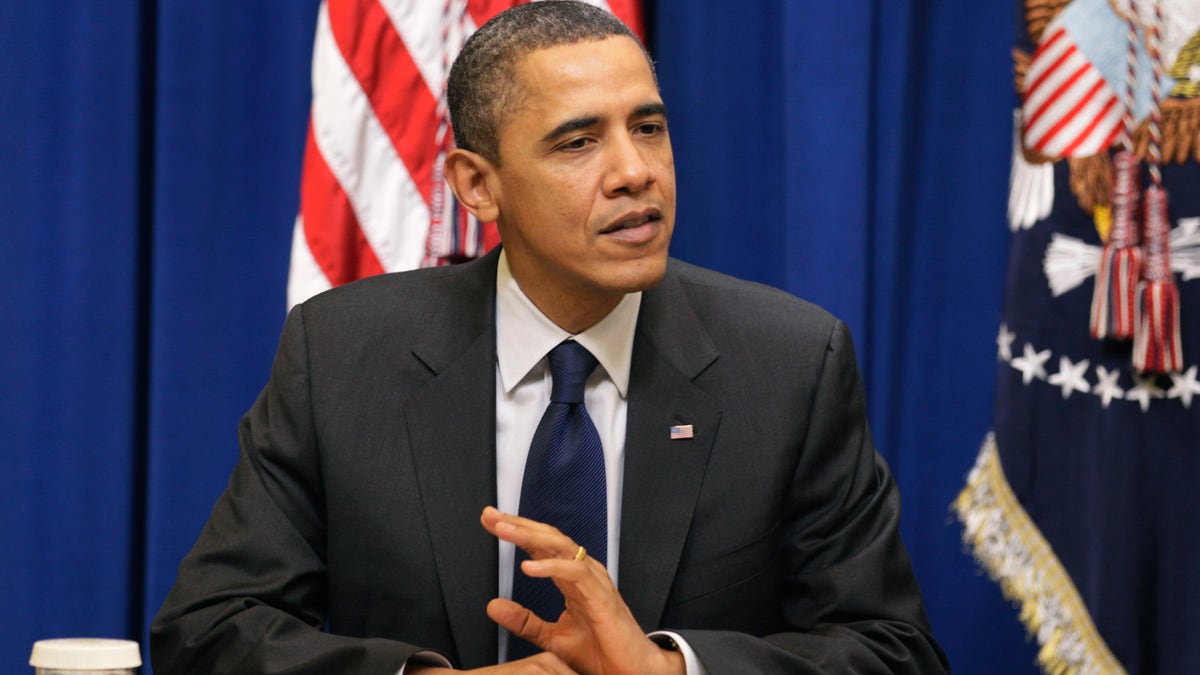
President Obama meets with Democratic Governors, Friday, Feb. 25, 2011, in the Eisenhower Executive Office Building on the White House complex in Washington. (AP) (AP2011)
The turmoil across the Middle East along with other foreign crises and budget battles across the country are threatening to overshadow President Obama's concerted efforts to show the nation that he is focused on reviving the economy as he ramps up his 2012 re-election campaign.
Since his State of the Union address last month, Obama has traveled away from Washington at least once a week, mostly stopping in political battleground states that will be crucial to his re-election bid, including Wisconsin, Michigan and Pennsylvania. He has a trip to Florida planned for next week.
But this week underscored the difficulties the president is having in drawing national attention to and building support for his economic message against the backdrop of escalating violence in Libya, massive protests in Wisconsin, Indiana and Ohio over union rights and political gridlock on Capitol Hill.
On Tuesday, Obama curried favor with small businesses in politically important Ohio, pushing his plans to boost American competitiveness by increasing spending on sectors like education and infrastructure.
That agenda, however, is running up against opposition from some Republican governors in cash-strapped states, and GOP lawmakers on Capitol Hill, whose demands for deep spending cuts raise the prospect of a federal government shutdown.
The president's domestic initiatives have also been overshadowed this week by Muammar Qaddafi's bloody crackdown on protesters in Libya, and news that four Americans were killed at the hands of pirates off the coast of Africa.
The violence in Libya continued to overshadow Obama's domestic agenda through the rest of the week, including his announcement Wednesday of the leaders from business and labor he named to his newly created jobs and competitiveness council and their first meeting on Thursday when he told members that its top priority must be creating jobs during a period of fiscal restraint.
The president drew more attention for a speech he delivered later Thursday in which condemned the violence in Libya as "outrageous" and "unacceptable" and said he was dispatching Secretary of State Hillary Clinton to Geneva, Switzerland for international talks aimed at stopping the violence.
On Friday, Obama signed an executive order freezing the assets held by Qaddafi and four of his children in the United States.
As was the case during the 2008 campaign, Obama aides are willing to forgo national media headlines in favor of mostly positive coverage in local media outlets in regions the president visits. They're also courting the press in swing states even when Obama is not on the road, inviting reporters from local television stations in Virginia, Wisconsin and Ohio to the White House for interviews last week.
Keeping with his pledge to focus more on jobs following his party's sweeping defeats in the midterm elections, Obama's message to swing state voters is strictly economic. He's touting cuts to some domestic programs in his proposed budget as a way to bring down the deficit, while also citing the need for increased spending on education, infrastructure and research as a way to boost job growth and help the country compete in the global economy.
"By cutting back on what we don't need, we can invest in the future. We can invest in the things that are critical to our long-term success," Obama said Tuesday to more than 100 small business leaders gathered at Cleveland State University.
However, Obama's calls for increased spending run counter to the deep budget cutting steps being taken by governors in Wisconsin, New Jersey, Indiana and Ohio, where Gov. John Kasich is backing state legislation that would end collective bargaining for public employees. Kasich greeted Obama at the airport Tuesday upon his arrival in Cleveland.
Supporters of the Ohio bill, as well as a similar measure backed by Wisconsin Gov. Scott Walker, say the measures would help control spending and provide cash-strapped states greater flexibility.
Opponents of the bill have been protesting in Ohio's capital all week. Similar protests in Wisconsin have attracted national attention, and Obama himself waded into the dispute last week by arguing that limiting bargaining rights "seems like more of an assault on unions."
Obama also faces budget battles back in Washington, where the lawmakers are debating a bill to fund the government through Sept. 30. The Republican-led House passed a bill early Saturday that cuts $61 billion for hundreds of federal program. Though the bill faces longer odds in the Senate, Obama has threatened a veto should the measure land on his desk.
If no compromise over the budget is reached by March 4, parts of the government could shut down.
On Saturday, Obama devoted his weekly Internet and radio address to warning of an economic meltdown if Congress cannot agree on spending cuts and avoid a government shutdown.
"For the sake of our people and our economy, we cannot allow gridlock to prevail," Obama said. "I urge and expect them to find common ground so we can accelerate, not impede, economic growth."
The Associated Press contributed to this report.





















